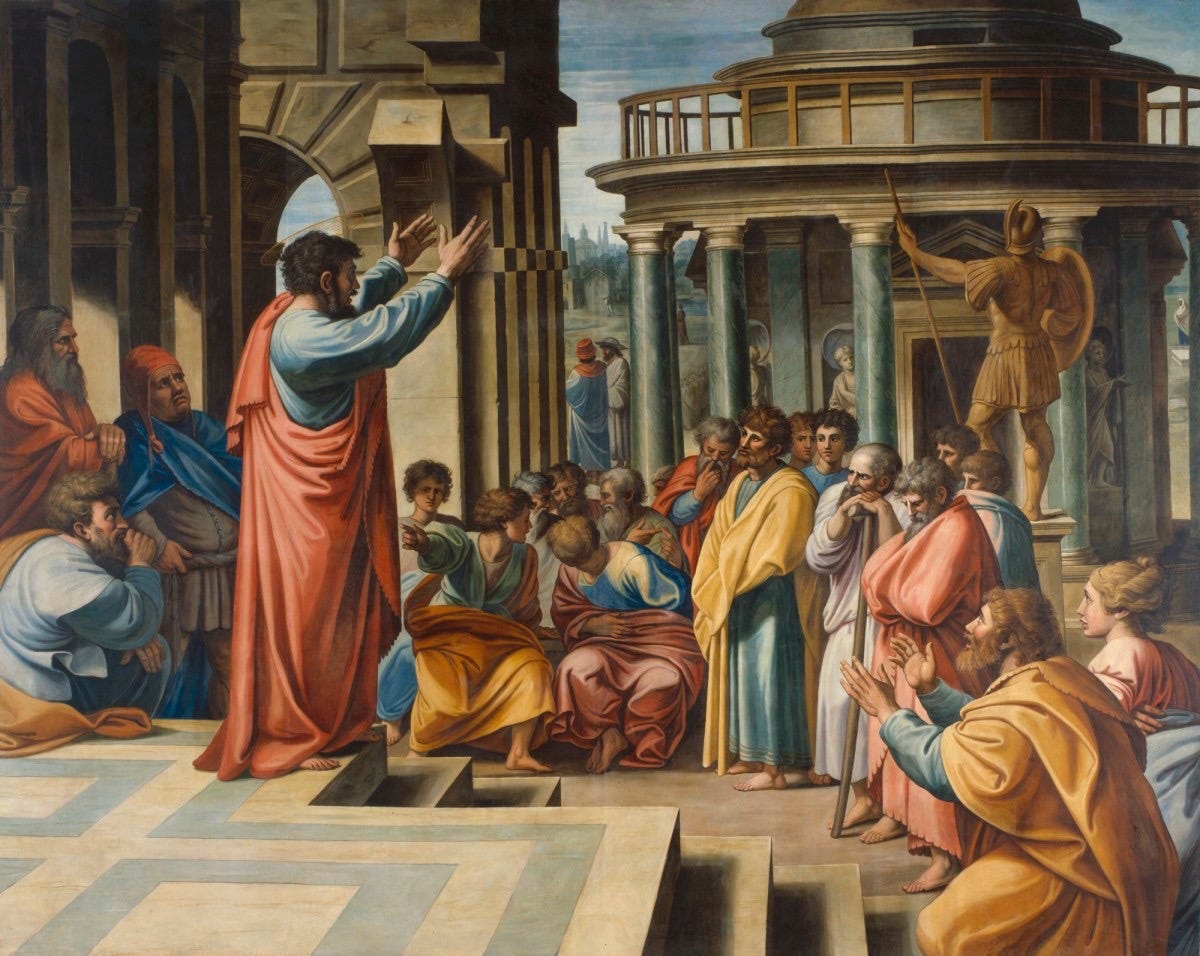For we also are His children
Acts 17:24-28 Paul’s sermon at the Areopagus in Athens began a transformation from belief in a pantheon of lesser gods to a belief in the one true God
Paul Preaching in the Areopagus, 1729-1731, Sir James Thornhill, based on a sketch by Raphael. From the collection of the Royal Academy of Arts.
”The God who made the world and all things in it, since He is Lord of heaven and earth, does not dwell in temples made with hands; nor is He served by human hands, as though He needed anything, since He Himself gives to all people life and breath and all things; and He made from one man every nation of mankind to live on all the face of the earth, having determined their appointed times and the boundaries of their habitation, that they would seek God, if perhaps they might grope for Him and find Him, though He is not far from each one of us; for in Him we live and move and exist, as even some of your own poets have said, ‘For we also are His children.’“
Acts 17:24-28 NASB1995
One of the longer books of the New Testament is the Acts of the Apostles. It and the Gospel of Luke — which are thought to have been written by the same person — make up almost a quarter of the text of the New Testament.
Acts is important for a number of reasons, but mainly because it picks up the history of the early Christians and the struggles encountered while establishing the church. In it, there is a geographical change from Jerusalem — the center of the Jewish faith and God’s people of the first covenant — to Rome, the center of the Gentile world at the time. Two of the apostles predominate Acts: Peter, who represents the Jewish Christian church in Jerusalem, and Paul, representing the mission to the Gentiles.
Image from an animated map depicting the spread of Christianity in the 1st Century AD: The Map As History
At this point in Acts, Paul is in Athens, the philosophical center of the world where nothing was more likely to get attention than new ideas. He preached the Gospel of Jesus, which earned him an invitation to speak at Mars’ Hill (the Areopagus), a place for debate and home of a ruling political council.
Paul’s sermon at the Areopagus was brilliant, and is the core of Acts 17:22-29. The sermon is considered, in the words of Bishop Robert Barron in a 2019 article in WordOnFire, “A Masterclass in Evangelism”. Rather than immediately starting with his usual exposition of Old Testament Scripture pointing to the Messiah — who was then revealed as Jesus Christ — Paul appealed to the Athenian elite by complimenting them on how religious they were.
The gods of the Greek pantheon, all of whom had numerous shrines and temples dedicated to them in Athens. Image from Mythopedia.
The city at that time was filled with shrines and temples dedicated to the various gods of the Greek pantheon. Among those places of worship and sacrifice were altars dedicated “to the unknown god”, kind of a catch-all god if Zeus, Aphrodite, or any of the others gods of the world or afterlife.
Paul tells them in his sermon in Acts 17:24-28 exactly who that unknown god was — THE God. He made the world and all things in it. This concept was novel to the Greeks, who saw creation as a chance collection of atoms (the Epicurean view, which has influenced science since then) or cobbled together by the collection of lesser gods in their pantheon (the Stoic view). Basically, Paul started his explanation with Genesis 1:1, then points out that God is too large to be contained in a temple or shrine made with hands because He is the Creator and we are His creations.
In the next verse, Paul explains mankind’s common heritage from Adam through Noah; logically — and the Greeks were masters of logic — all men should be obligated to seek God. God is everywhere, not found in a shrine or temple, and we may find Him if we “grope for him”.
Paul then smartly summarizes this new theology for the Athenian elite by referring to the word of two Greek poets of the past — “for in Him we live and move and exist” (attributed to Epimenides from Crete, who lived about six hundred years earlier) and “For we also are His children” (attributed to Aratus, from about three hundred years earlier).
The Athenians at the Areopagus would have been familiar with these sayings, and Paul realized he could bridge the gap to the pagans by showing that the words reflected Biblical truth.
It would have been wonderful if the Athenians had immediately converted to Christianity at the end of Paul’s sermon. However, his ideas were met with a mixed reaction. Some were curious and wanted to hear more, with some of those becoming early Christians. Others mocked Paul and wanted him to leave immediately. Regardless of the reaction, Paul’s sermon kindled a curiosity that sparked the growth of Christianity around the world.
Heaven On Wheels Daily Prayer:
Father, thank You for the apostle Paul, who taught the good new so than mankind would hear the gospel of grace and receive salvation. Build in me a love for the lost, and help me to present the gospel to them with love and compassion. Let people in every nation and city hear the gospel and know that Jesus died for their sins, rose again, and that they will have their sins forgiven and have eternal life — if they have faith in Him. AMEN.





